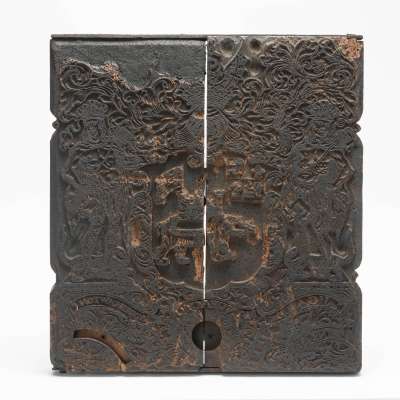Tillet block
Tillet stamps were a marketing device used for Exeter’s woollen cloth exports.
Pieces of woollen cloth for export were packed in cloth wrappers or tillets. Twenty or more wrapped pieces of cloth would be made up into a bale. An attractive mark, rather like a trademark, was stamped onto the tillet wrapper using a tillet block. The stamping was done in the workshop of a tilleter using a large tillet stamping press.
Tillet blocks were composite objects – the main block had recesses into which inserts could be placed. There were shield-shaped inserts with attractive, often heraldic designs. There were also smaller inserts for merchant names, merchant marks or lengths of cloth.
This block is very worn but has an unusual and interesting design. It appears to show two figures with feathered head-dresses and bow and arrows, probably representing Native Americans, or at least what a tillet carver thought a Native American looked like. The use of this image may relate to an Exeter merchant’s pride in exporting cloth around the world - including America and the Caribbean.
Pieces of woollen cloth for export were packed in cloth wrappers or tillets. Twenty or more wrapped pieces of cloth would be made up into a bale. An attractive mark, rather like a trademark, was stamped onto the tillet wrapper using a tillet block. The stamping was done in the workshop of a tilleter using a large tillet stamping press.
Tillet blocks were composite objects – the main block had recesses into which inserts could be placed. There were shield-shaped inserts with attractive, often heraldic designs. There were also smaller inserts for merchant names, merchant marks or lengths of cloth.
This block is very worn but has an unusual and interesting design. It appears to show two figures with feathered head-dresses and bow and arrows, probably representing Native Americans, or at least what a tillet carver thought a Native American looked like. The use of this image may relate to an Exeter merchant’s pride in exporting cloth around the world - including America and the Caribbean.
Object Summary
- Accession Loan No.
- 1895/12/120
- Collection Class
- Social and industrial history
- Collection Area Region
- Northern Europe
- Material
- wood | iron | | |
- Common Name
- tillet block
- Simple Name
- stamp
- Production Town
- Production Person Initials
- Production Person Surname
- Production Year Low
- Production Year High


